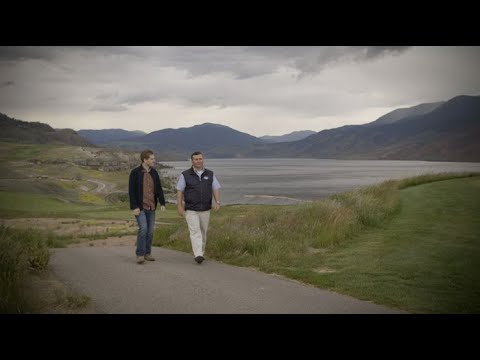Career Overview
Urban and land use planners develop plans and recommend policies for managing land use, facilities and related services for urban and rural or remote regions.
People in this career work for all levels of government and First Nations, as well as private and non-profit associations, including land and housing developers, engineering and other consulting companies, or as private consultants.
Job Titles
Duties
In general, urban and land use planners:
- Gather and analyze the demographic, economic, legal, cultural, physical and other factors that affect land use and community well being
- Meet with civic leaders, engineers, architects, lawyers, land developers, First Nations, the public, special interest groups and government authorities to develop land use and community plans
- Prepare and recommend land development concepts and plans for zoning, subdivisions, transportation, public utilities, community facilities, parks, agricultural and other land uses
- Prepare plans for environmental protection, such as wildlife preserves, watersheds, national and provincial parks
- Present plans, proposals or planning studies to the general public and other stakeholders
- Review and evaluate development proposals and permit applications that respond to zoning and government priorities
- Implement land use plans and administer zoning and land use by-laws
- Supervise and coordinate work of urban planning technicians and technologists
Earnings
Earnings is income that workers receive in exchange for their labour. Depending on the type of employment, earnings can be in the form of wages (hourly), salaries (fixed monthly or annual) or self-employed earnings.
Work Environment
# Workers Employed
2,935% Employed Full Time
74%Work in this occupation is usually performed in a structured environment such as an office. Hybrid work opportunities are often available.
Most urban planners also visit development sites and project areas.
Career Pathways
A master’s level degree or ongoing professional education and experience is often needed for advancement to senior or management positions.
Occupational Interests
It’s important to understand what kinds of occupations align with your interests.
For more about occupational interests visit Skills for the Future Workforce > Characteristics.
Here are the top occupational interest(s) for this career profile:
Education, Training and Skills
The paths to becoming an urban and land use planner are varied. The most direct path is through a bachelor's degree in urban and regional planning.
While a bachelor’s degree is usually the minimum education needed for entry level jobs, some employers may list a minimum high school diploma along with courses in planning, statistics or graphics, and skills in spreadsheet, mapping/GIS software and research.
Other employers may require:
- Membership in the Canadian Institute of Planners as a Registered Professional Planner (RPP)
- Membership in the Planning Institute of British Columbia
- A master's degree in urban and regional planning, geography, architecture, engineering, urban studies or a related discipline (for intermediate and senior positions)
Other paths include a bachelor’s degree in related disciplines, such as geography, architecture, engineering or urban studies, along with relevant work experience. Many urban and land use planners have backgrounds in architecture, landscape architecture, community development, public administration and other applied and social science fields.
Education programs in B.C.

Top Skills
Every job calls for a certain set of skills. Knowing those skills is the first step in finding a good career fit.
Here, you will find the 10 most relevant workplace skills. Some are more important to achieving success in a certain career than others. These skills may come naturally to you or you may need to gain them through education, training and experience.
See the list of work-related skills below, ranked in order of importance for this career. Check out the list and see if this career matches your skills—take that first step!
Giving full attention to what other people are saying, taking time to understand the points being made, asking questions as appropriate, and not interrupting at inappropriate times.
Considering the relative costs and benefits of potential actions to choose the most appropriate one.
Talking to others to share information effectively.
Understanding written sentences and paragraphs in work-related documents.
Using logic and reasoning to identify the strengths and weaknesses of alternative solutions, conclusions or approaches to problems.
Determining how a system should work and how changes in conditions, operations and the environment will affect outcomes.
Communicating effectively in writing as appropriate for the needs of the audience.
Being able to solve novel, ill-defined problems in complex, real-world settings.
Identifying measures or indicators of system performance and the actions needed to improve or correct performance, while meeting the goals of the system.
Being aware of others’ reactions and understanding why they react as they do.
Labour Market Statistics
Discover data, facts and information that have been gathered and analyzed. Learn about the characteristics of the economy and labour market in B.C.
Employment
Find out about employment types and trends by region and industry.
Employment
2,935Employment by Region







| Region | Employment | % Employment of this Occupation |
|---|---|---|
| Cariboo | 60 | 2.0% |
| Kootenay | 95 | 3.2% |
| Mainland/Southwest | 1,810 | 61.7% |
| North Coast and Nechako | 50 | 1.7% |
| Northeast | 35 | 1.2% |
| Thompson-Okanagan | 215 | 7.3% |
| Vancouver Island/Coast | 665 | 22.7% |
Labour Market Outlook
The B.C. Labour Market Outlook is a 10-year forecast of the expected supply and demand for labour in the province. It’s usually updated every year. The purpose is to provide British Columbians with the knowledge to make informed decisions on careers, skills training, education and hiring.
Forecasted Job Openings (2025-2035)
1,210Forecasted Job Openings
Forecasted Employment Growth Rate
Composition of Job Openings
Job Openings by Region (2025-2035)







| Region | Job Openings | Avg. Annual Employment Growth |
|---|---|---|
| Cariboo | 10 | -0.3% |
| Kootenay | 30 | 0.1% |
| Mainland/Southwest | 690 | 0.9% |
| North Coast and Nechako | 0 | -0.6% |
| Northeast | 10 | 0.9% |
| Thompson-Okanagan | 80 | 0.7% |
| Vancouver Island/Coast | 390 | 1.6% |
Industry Highlights
Learn about the opportunities in B.C.'s major industries, including employment trends, earning potential, locations of work and more.
Forecasted Job Openings by Industry
| Industry | Job Openings (2025-2035) |
|---|---|
| Public Administration | 570 |
| Professional, Scientific and Technical Services | 260 |
| Transportation and Warehousing | 80 |
| Finance, Insurance and Real Estate | 50 |
| Construction | 50 |
Insights from Industry
Due to retirements and population growth, there is a shortage of urban and land use planners in B.C., particularly in housing, current (short-term) development, urban design, transportation, climate change adaptation and environmental planning.
Entry level positions in urban and land use planning are easier to get outside of metropolitan centres.
Resources
-
Canadian Association of Certified Planning Technicians (CACPT)cacpt.org
-
Canadian Institute of Planners (CIP)www.cip-icu.ca
-
Canadian Journal of Urban Research (CJUR)cjur.uwinnipeg.ca/index.php/cjur
-
Canadian Urban Institute (CUI)www.canurb.org
-
CivicInfoBC – Careerswww.civicinfo.bc.ca/16.asp
-
CivicJobs.cawww.civicjobs.ca/index.asp
-
International Society of City and Regional Planners (ISOCARP)isocarp.org/
-
Land and Water Planning (Government of B.C.)www.planninginpartnership.ca/
-
Ministry of Housing and Municipal Affairswww2.gov.bc.ca/gov/content/governments/organizational-structure/ministries-organizations/ministries/housing
-
Planning Institute of British Columbia (PIBC) – Job Postingswww.pibc.bc.ca/content/current-job-postings








